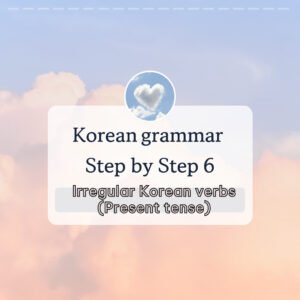Everything About 아/어/해서 grammar
Hello, everyone!
Today, we will be learning one of the crucial connectors in Korean grammar: the 아/어/해서 grammar!
아서, 어서, and 해서 are essential in everyday life, but they can be quite confusing due to their usage.
Here, I’ll provide you with plenty of examples and exercises so that you can totally master this 아/어/해서 grammar! I even made a separate video and listening practice regarding this grammar, so after studying it, make sure to check out that post as well.
I will explain each point step by step to facilitate understanding.
So just follow along with me!
Part 1,
Let’s grasp the concept of grammar
아/어/해서: So, So..that, Because, And
How to Form “아/어/해서”
The grammar form “아서/어서” (also written as “해서”) is used to connect two actions or states sequentially.
아/어/해서 is a shortened form of 그래서.
Check out these sentences:
I’m hungry, so I will eat: 배고파요. 그래서 먹을 거예요.
Here, we can simply drop the “요” and “그래” parts, and combine like this:
배고파서 먹을 거예요.
I have a lot of work, so I’m busy: 일이 많아요. 그래서 바빠요.
Similarly, we drop the “요” and “그래” parts, and combine like this:
일이 많아서 바빠요.
This grammar is called 아/어/해서 because we conjugate the verbs to the present tense, then add ‘서’.
만나요(I meet) -> 만나서
먹어요(I eat) -> 먹어서
여행해요(I travel) -> 여행해서
추워요(I’m cold) -> 추워서
바빠요(I’m busy) -> 바빠서
Forming 아/어/해서 is very simple!
Only irregular one: 예요 / 이에요 + 그래서 can be (이)여서 or (이)라서 ! (both are commonly used)
ex) 가수예요. 그래서 노래를 잘 해요 (She’s a singer, so she sings well.)
→ 가수여서 노래를 잘 해요./ 가수라서 노래를 잘 해요.
학생이에요. 그래서 많이 공부해요. (I’m a student, so I study a lot.)
→ 학생이여서 많이 공부해요. / 학생이라서 많이 공부해요.
There are two main usages of “아/어/해서”:
(1) So, So.. that, Because
– I’m Korean, so of course I speak Korean.
나는 한국인이에요. 그래서 당연히 한국어 해요.
→ 나는 한국인이라서 당연히 한국어 해요.
It’s also commonly used as “so.. that” in English.
– I was so tired that I slept at 8
나 너무 피곤했어요(I was so tired)+ 그래서(so) + 여덟시에 잤어요(I slept at 8)
→ 나 너무 피곤해서 여덟시에 잤어요. / 나 너무 피곤했어서 여덟시에 잤어요.
* Present tense is more commonly used, but if you want to emphasize that it happened in the past, you can conjugate it to the past tense and combine it with 서!
– I was so busy that I couldn’t have lunch.
나 너무 바빴어요(I was so busy) + 그래서(so) + 점심을 못 먹었어요(I couldn’t have lunch)
→ 나 너무 바빠서 점심을 못 먹었어요. / 나 너무 바빴어서 점심을 못 먹었어요.
Now, let’s look at a slightly different example. To say “I ate because I was hungry,” we use the 아/어/해서 grammar for the “because” part. In Korean, this part should come first in the sentence:
“I ate because I was hungry” becomes 배고파서 밥 먹었어요. (Because I was hungry, I ate)
Here, the main verb is “ate” (먹었어요). In Korean, the principal verb should always stay at the end of the sentence. So, we always say the “because” part first, followed by the main verb.
I went home because I was tired.
→ 피곤해서 집에 갔어요. (Because I was tired, I went home or I was tired so I went home)
Because I had a lot of homework, I couldn’t go out.
→ 숙제가 많아서 못 나갔어.
I ate a lot because it was delicious.
→ 맛있어서 많이 먹었어요.
Because the weather was nice, we went to the park.
→ 날씨가 좋아서 공원에 갔어요.
You can end sentences using the “아/어/해서” grammar too, such as in a response:
(1) 왜 늦게 왔어? (Why are you late?)
버스를 놓쳐서. (Because I missed the bus.) – Informal
버스를 놓쳐서요. (Because I missed the bus.) – formal
(2) 왜 슬퍼? (Why are you sad?)
엄마가 아파서. (Because my mom is sick.) – Informal
엄마가 아파서요. (Because my mom is sick.) – formal
(3) 왜 그래? (What’s wrong?)
인터넷이 느려서. (Because the internet is slow.) – Informal
인터넷이 느려서요. (Because the internet is slow.) – formal
(2) And
아/어/해서 is also used to mean “and” when linking two actions that are closely related or sequential, where the first action naturally leads to the second! (This is the difference between “고” and “아/어/해서” grammar.)
Examples:
백화점에 가서 옷을 샀어요. (I went to the department store and bought clothes (there).)
– > I bought clothes “at the department store”, so these 2 sentences are intrinsically linked. Using 아/어/해서 grammar sounds more natural than using “고”.
친구를 만나서 이야기했어요. (I met a friend and talked (with the friend).)
– > I met a friend and we talked. so these 2 sentences are intrinsically linked, in this case using 아/어/해서 sounds more natural than using “고”.
식당에 가서 밥을 먹었어요. (I went to a restaurant and ate (there).)
– > I went to a restaurant and ate “at the restaurant”. so these 2 sentences are intrinsically linked.
But often, 아/어/해서 and 고 are interchangeable when the meaning is “and”. The difference between them is very subtle.
Lets look at these comparison examples:
I bought cake and ate it.
케이크를 사고 먹었어요.
케이크를 사서 먹었어요.
In this case, you can use either. But “사서” sounds a bit better because it emphasizes that you bought the cake and then ate “that cake”. Using “고” is not incorrect, but “사서” provides a clearer connection between the actions.
Here are some cases 아/어/해서 grammar is always used. Let’s memorize these together!
(1) Specific body posture (e.g. lying, sitting, or standing)
침대에 누워서 티비를 봐요 (I watch TV lying on the bed.)
눕다: to lie (누워요 (present tense) + 서)
소파에 앉아서 신문을 봐요 (I read the newspaper sitting on the couch.)
앉다 : to sit ( 앉아요 + 서)
서서 담배를 피워요 (I smoke standing.)
서다 : to stand (서요 + 서)
(2) When describing movement without using transportation (e.g. running, walking)
걸어서 학교에 가요. (I walk to school.)
걷다: to walk (걸어요 (present tense) ) and we combine with 가요.
걸어 + 서 + 가요. (I go walking) – This is how we normally say ‘to walk’. You can simply memorize “to walk” as 걸어서 가다. or 걸어 가다 (서 can be omitted)
+ 집이 가까워서 걸어서 학교에 가요.
(Because my house is close, I walk to school.)
뛰어서 가요. (I run)
뛰다: to run (뛰어요 + 서 + 가요) literally meaning “I go running”
To run: 뛰어서 가다 / 뛰어 가다(서 can be omitted)
+ 한국어 수업에 늦어서 뛰어서 가요.
(Because I’m late for Korean class, I run.)
When using transportation to describe movements, we typically use the “고” grammar:
타다 means to ride, so we normally use 타다 + 고 grammar together.
차 타고 가요. (I go by car.)
자전거 타고 가요. (I go by bicycle.)
버스 타고 가요. (I go by bus.)
(3) With the 먹다(to eat) verb.
To say “I cook”, we can simply say “요리해요”. (요리하다: to cook)
However, often you’ll hear Koreans saying “요리해(서) 먹어요“. (서 is often omitted)
Similarly, to order food, the verb is “시키다”. You can simply say “시켜요” (시키다: to order).
But most commonly, Koreans say “시켜(서) 먹다“, which literally means “to order and eat”.
Let’s order delivery food! : 배달 시켜(서) 먹어요! (배달: deliver)
To say “buy food”, we commonly say : 사(서) 먹다. (사다 : to buy), which literally means “to buy and eat” (서 is mostly omitted)
To say “eat out”, we commonly say : 나가(서) 먹다. (나가다 : to go out), which literally means ” to go out and eat”.
오늘은 주말이에요. 나가서 사 먹어요! ( let’s go out and eat out!)
So when you’re deciding what to have for dinner, you could ask your friend like this:
우리 오늘은 나가서 먹을까, 요리 해 먹을까, 배달 시켜 먹을까?
Shall we eat out today, cook, or order delivery?
↑ Just memorize this whole sentence!
사 먹다/요리해 먹다/ 시켜먹다/ 나가서 먹다 is how we say “eat”, and we are just providing extra information about how we got the food. I think it is a part of Korean culture.😂 So, get familiar with these usages!
Part 2,
Practice making sentences
1. This week, I’m so busy that I won’t have time.
(This week: 이번주 / busy:바쁘다 / time: 시간)
2. The students were so loud, that I couldn’t hear anything
(be loud: 시끄럽다 / hear: 듣다 / anything: 아무것도)
3. I have to go grocery shopping because it’s Saturday
(go grocery shopping: 장 보러 가다/ Saturday: 토요일)
4. I didn’t want to eat more because I was full
(more: 더/ be full: 배부르다)
5. I was hungry, so I bought bread and ate it. (casually!)
(hungry: 배고프다)
6. Because I have a meeting tomorrow, I have to prepare my presentation tonight.
(meeting: 미팅 / prepare: 준비하다 / presentation: 발표 / tonight: 오늘밤)
7. Because I’m a foreigner, my Korean skills are still lacking.
(foreigner: 외국인 / skill: 실력 / still: 아직/ lack: 부족하다)
8. I’m going to bed early tonight, because I’m really exhausted today
(go to bed: 자러 가다. / early: 일찍 / tonight: 오늘밤 / exhausted: 피곤하다(tired))
9. I won’t eat fried chicken today, because I’m going to start losing weight from tomorrow.
(fried chicken: 치킨 / lose weight: 살 빼다 / from: 부터/ tomorrow: 내일)
* You don’t need to translate the “start” part in Korean
10. I don’t want to do Korean homework, because it’s too complicated. (casually!)
(homework: 숙제/ too: 너무/ complicated: 복잡하다)
11. Since the traffic was bad, I arrived late to the appointment
(traffic is bad: 차(가) 막히다 / arrive: 도착하다 / late: 늦게 / appointment: 약속)
12. She didn’t want to go out because it was raining heavily.
( go out: 나가다 / rain : 비(가) 오다 / heavily : 많이(a lot))
13. Because I’m an officer worker, I’m always waiting for my payday
(officer worker: 직장인/ wait: 기다리다/ always: 항상/ payday: 월급날 (paycheck is 월급!))
14. It’s on me, let’s order delivery food! (casually!)
(It’s on me: 내가 쏘다 / order: 시키다(try to say “order and eat”) / delivery: 배달)
15. I slept in and now I’m running to work.
(sleep in : 늦잠자다 / run : 뛰다 (try to say run and go) / work=company: 회사)
Thy these on your own first, before checking the answers!
These are the answers:
1. This week, I’m so busy that I won’t have time.
(This week: 이번주 / busy:바쁘다 / time: 시간)
이번주에 바빠서 시간(이) 없을 거예요. (This week I’m busy, so I won’t have time)
* I’m busy(바빠요) + 서(so) -> 바빠서 (I’m busy, so)
* To say “don’t have,” you can use the verb 없다, and in the future tense, it becomes 없을 거예요. Informally, it’s 없을 거야.
2. The students were so loud, that I couldn’t hear anything
(be loud: 시끄럽다 / hear: 듣다 / anything: 아무것도)
학생(들)(이) 시끄러워서, 아무것도 못 들었어요.
* 시끄럽다 becomes 시끄러워요 in the present tense (ㅂ irregular). Here, we drop ‘요’ and add ‘서’ to mean “so… that.”
* 들 (plural particle) and 이/은 (subject particles) are optional!
* You can say “시끄러웠어서” (past tense) if you want to emphasize that it happened in the past. However, using the present tense sounds more natural and will be easier for you. So stick with the present tense!
3. I have to go grocery shopping because it’s Saturday.
(go grocery shopping: 장 보러 가다/ Saturday: 토요일)
토요일이라서 장 보러 가야 해요/돼요.
* We have to start with the reasoning, so here “because it’s Saturday” comes first.
– 토요일이에요(It’s Saturday) + 서 (because) -> 토요일이라서 (Because It’s Saturday)
-> 토요일이에요 + 서 becomes 토요일이라서 or 토요일이여서. (Both are correct)
* 장 보러 가다 is a very common expression to say “go grocery shopping!” Memorize it!
* Remember how to say “have to,” right? If you don’t remember, click here and check out my previous post!
4. I didn’t want to eat more because I was full
(more: 더/ be full: 배부르다)
배불러서 더 안 먹고 싶었어요
* We have to start with the reasoning, so here “because I was full” comes first.
* 배부르다 conjugates to 배불러요 (I’m full) in the present tense (르 irregular), then we drop ‘요’ and add ‘서'(because), forming 배불러서.
* Remember how to say “want to,” right? If you don’t remember, click here and check out my previous post!
5. I was hungry, so I bought bread and ate it. (casually!)
(hungry: 배고프다 / bread: 빵)
배고파서, 빵 사 먹었어.
* This is what I say literally every day! It might sound awkward in English, but this is a very common way to say it in Korean.
* Buy and eat = 사요(buy) + 서(and) + 먹어요(eat) becomes 사서 먹어요, and often 서 is omitted, so simply 사 먹어요!
6. Because I have a meeting tomorrow, I have to prepare my presentation tonight.
(meeting: 미팅 / prepare: 준비하다 / presentation: 발표 / tonight: 오늘밤)
내일 미팅(이) 있어서, 오늘밤에 발표 준비해야 해요.
* To say “to have”, we use the 있다 verb. 있다 -> 있어요(present tense) + 서(because) = 있어서
* We put “에” after 오늘밤(tonight) to indicate the specific time.
We don’t put it after 오늘, 내일, 어제
* 준비하다(prepare) -> 준비해야 해요/ 준비해야 돼요(have to)
7. Because I’m a foreigner, my Korean skills are still lacking.
(foreigner: 외국인 / skill: 실력 / still: 아직/ lack: 부족하다)
외국인이라서, 한국어 실력(이) 아직 부족해요.
* 외국인이에요 + 서(because), it changes to 이라서 or 이여서. 외국인이여서 is also correct
* 부족하다 (to lack) can simply be conjugated to the present tense. It also means “to be not enough”, so to say “It’s not enough”, you can say: 부족해요. Since it’s an adjective in Korean, we can’t conjugate it with -고 있어요 or -는 중이에요.
8. I’m going to bed early, because I’m really exhausted today. (casually!)
(go to bed: 자러 가다. / early: 일찍 / tonight: 오늘밤 / exhausted: 피곤하다(tired))
오늘 진짜 피곤해서 일찍 자러 갈 거야
* We have to start with the reasoning, so here “because I’m really exhausted” comes first.
피곤해요(I’m tired) + 서 (because) -> 피곤해서 (Because I’m tired)
* 자러 가다 means “to go to sleep, to go to bed”. Here, I’m using the future tense for “I’m going to”, and formally you can say 자러 갈 거예요.
9. I won’t eat fried chicken today, because I’m going to start losing weight from tomorrow.
(fried chicken: 치킨 / lose weight: 살 빼다 / from: 부터/ tomorrow: 내일)
내일부터 살 뺄거라서 오늘 치킨 안 먹을 거예요.
* Take a close look at this sentence “살 뺄 거라서 (because I’ll lose weight)”, here I’m using the future tense. 살 뺄 거예요 (I’ll lose weight) + 서 (because) -> 살 뺄 거라서 / 살 뺄 거여서.
예요 changes to 라서 or 여서.
Here are more examples:
I will clean my room because my friends are coming over tomorrow.
내일 친구들이 올 거라서 내 방 청소할 거예요.
(올 거예요(will come) + 서(because) -> 올 거라서 / 올 거여서)
I won’t go out tonight because I (will) have to wake up early tomorrow.
내일 일찍 일어나야 할 거라서 오늘 밤에는 안 나갈 거예요.
(일어 나야 해요 ( I have to wake up, present tense) -> 일어 나야 할 거예요(I will have to wake up, future tense) -> 일어 나야 할 거라서(Because I will have to wake up, combined with 서) or 일어 나야 될 거라서 or 일어 나야 할 거여서. Everything works.
I won’t buy anything today because I’m going to start saving money from next month.
다음 달부터 돈을 모을 거라서 오늘 아무것도 안 살 거예요.
(모을 거예요(will save) + 서(because) -> 모을 거라서 / 모을 거여서)
10. I don’t want to do Korean homework, because it’s too complicated. (casually!)
(homework: 숙제/ too: 너무/ complicated: 복잡하다)
너무 복잡해서 한국어 숙제 안 하고 싶어
* We have to start with the reasoning, so here “because it’s too complicated” comes first.
복잡해요(It’s complicated) + 서(because) -> 복잡해서 (because It’s complicated)
11. Since the traffic was bad, I arrived late to the appointment.
(traffic is bad: 차(가) 막히다 / arrive: 도착하다 / late: 늦게 / appointment: 약속)
차가 막혀서, 약속에 늦게 도착했어요
* 막히다 means to block, be clogged, or be jammed. 차 means a car, so 차가 막히다 literally means “cars are jammed.” 막히다 is conjugated to 막혀요 (present) + 서 (because) -> 막혀서.
* We use “에” to indicate “destination,” as in arriving at a certain place: 에 도착하다.
* 약속 has several meanings in Korean; it can refer to casual plans or meetings with your friends too.
– 나 오늘 약속 있어 (I have plans today)
– 주말에 약속 있어? (Do you have a plan on the weekend?)
12. She didn’t want to go out because it was raining heavily.
( go out: 나가다 / rain : 비(가) 오다 / heavily : 많이(a lot))
(그 사람은) 비가 많이 와서 안 나가고 싶어 했어요
* Because it was raining a lot ->
비가 많이 와요(it rains a lot, present tense) + 서(because) -> 비가 많이 와서
* To refer to “she,” you can say “그 사람,” “그 여자,” “그 분 (formal),” or “걔 (informal).”
* When the subject is a third party, we change 고 싶어요 to 고 싶어해요. For example, “She wants to go out” is 나가고 싶어해요, and “She wanted to go out” is 나가고 싶어했어요.
13. Because I’m an officer worker, I’m always waiting for my payday.
(officer worker: 직장인/ wait: 기다리다/ always: 항상 / payday: 월급날 (paycheck is 월급!))
직장인이라서, 월급날(만) 항상 기다리고 있어요
* 직장인이에요(I’m an office worker) + 서(because) -> 직장인이라서 / 직장인이여서
* We also use 회사원 to refer to an “office worker,” but 직장인 means anyone who has a job. It’s a different way to say “I have a job.”
* Here, adding 만 (only) after 월급날 (payday) sounds very natural, as in “I’m only waiting for my payday,” to emphasize the payday.
* You can say 기다리는 중이에요 instead of 고 있어요! They both imply “be waiting.”
14. It’s on me, let’s order delivery food! (casually!)
(It’s on me: 내가 쏘다 / order: 시키다(try to say “order and eat”) / delivery: 배달)
내가 쏠게, 배달 음식 시켜 먹자!
* We commonly say “it’s on me” as “내가 쏠게” in Korean. This phrase uses the future tense form “ㄹ/을게요” to express the intention or promise of treating someone. Memorize it as: “It’s on me” = “내가 쏠게!“
* order and eat = 시켜요(to order) + 서(and) + 먹어요(eat) -> 시켜서 먹어요(order and eat)
Often “서” is omitted, making it “시켜 먹어요”.
* The ending 자 (let’s):
– Let’s go : 가자! (가다 + 자)
– Let’s eat! : 먹자! (먹다 +자)
– Let’s study! : 공부하자! (공부하다 + 자)
15. I slept in and now I’m running to work (casually!)
(sleep in : 늦잠자다 / run : 뛰다 (try to say run and go) / work=company: 회사)
늦잠자서 지금 회사에 뛰어 가고 있어요.
* Here, for the “and” part, I would use the grammar form “아/어/해서” since two sentences are linked. (I slept in, as a result, I’m running late.)
* 늦잠자요(sleep in, present tense) + 서(and) -> 늦잠자서(I slept in and)
* run and go = 뛰어요(run, present tense) + 서(and) + 가요(go, present tense) -> 뛰어서 가요(I run and go). And 서 is often omitted, making it “뛰어 가요.”
To say “I’m running” in the ongoing present tense, we can conjugate “가다” to “가고 있어요” or “가는 중이에요“.
Here are more examples and natural usages of the “아/어/해서” grammar. Check them out here!
Great job!
You’ve been doing an excellent job—keep up the good work!

To book a lesson with me, click here!
To improve your listening skills, check it out here!
Come visit my Youtube channel as well!





